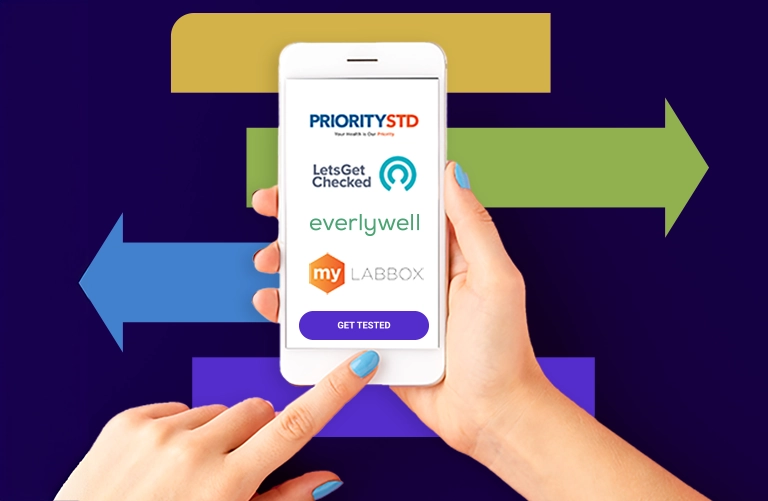Understanding Hepatitis B: Symptoms, Testing & Treatment
Understanding Hepatitis B: Symptoms, Testing & Treatment
Hepatitis B is a prevalent virus in the U.S. and around the world. It’s known to be the most common serious liver infection that is up to 100 times more infectious than the HIV virus, and is the primary cause of liver cancer. Learn more about this STD, what symptoms it may cause, how it can affect the body, testing procedures, and available treatment options.
Get Tested for Hepatitis B
ABOUT HEPATITIS B
What Is Hepatitis B And How Does It Affect Your Body?
ABOUT HEPATITIS B
What Is Hepatitis B And How Does It Affect Your Body?
Caused by a virus, hepatitis B is found to be most highly concentrated in the blood. However, it can be present in other bodily fluids such as semen, vaginal secretions, and saliva. Hepatitis B can be spread through unprotected sex with an infected partner, and risk factors include multiple partners, sex between men, a history of other STDs, and intravenous drug use. Babies can also get this infection if the pregnant person is positive for hepatitis B.
Hepatitis B can result in two different types of infection; acute infection where it lasts for only a few weeks, or chronic hepatitis B which is a serious, lifelong illness.
Acute infection may not result in any symptoms, but for those that do, symptoms of acute hepatitis B include:
- Fever
- Fatigue
- Loss of appetite
- Nausea
- Vomiting
- Abdominal pain
- Dark urine
- Clay-colored bowel movements
- Joint pain
- Jaundice
Most individuals with chronic hepatitis won’t have any symptoms, and may not develop any for decades. Once symptoms do develop, they will be similar to those with an acute infection, but may indicate advanced liver disease. Chronic hepatitis B can develop into other serious health issues like liver damage, liver failure, liver cancer, and even death.
Sources: CDC, Sexually Transmitted Infections Treatment Guidelines, 2021, Hepatitis B Virus (HBV) Infection and CDC, Viral Hepatitis Overview
HEPATITIS B TESTING INFORMATION
What To Know About Hepatitis B Testing
A simple blood test is all that is required to determine whether or not you have hepatitis B. However, there are several tests available that can determine whether you have chronic or acute infection, are immune after vaccination, or may have been infected in the past but have cleared the virus naturally. There are even tests that could determine how easily you can pass hepatitis B to others if you are infected. When ordered by a physician, the hepatitis B test involves a 3-part blood panel that screens for the presence of antigens and/or antibodies that will provide these answers.
Sources: Hepatitis B Foundation, Understanding Hepatitis B Blood Tests (PDF)
Because of the test complexity, results are typically returned within 7 to 10 days after the lab receives your sample.
Source: Hepatitis B Foundation, Understanding Hepatitis B Blood Tests (PDF)
There are no medications currently to treat acute hepatitis B. If you are experiencing mild symptoms, you may simply receive recommendations to rest, consume proper nutrition, and hydrate. If there are more severe symptoms, you may need to be hospitalized.
Chronic hepatitis B can be treated with several medications. These may not be viable options for all individuals due to potential side effects, but those who do take medication will most likely need to take it for the rest of their lives as there is no cure. You will need to work closely with your healthcare provider to regularly monitor liver function and follow healthy lifestyle habits, such as avoiding alcohol, eating healthy, and staying active.
The good news is, hepatitis B can actually be prevented with vaccinations. All infants, those younger than 19 who have not already been vaccinated, adults aged 19 -59, and those aged 60 and older with certain risk factors should be vaccinated for hepatitis B. You will need to receive all shots within the vaccine series to achieve full protection against the virus.
Source: CDC, Viral Hepatitis Overview
- Those born in countries with hepatitis B infections more than or equal to 2%
- Those born in the U.S. and not vaccinated as infants
- Men who have sex with men
- People who inject drugs
- People with HIV
- Those who are in a household or have sexual contact with someone who has hepatitis B
- Individuals requiring immunosuppressive therapy
- People with end-stage renal disease
- Blood and tissue donors
- People with elevated alanine aminotransferase levels
- Pregnant people
- Infants born to individuals with hepatitis B infection